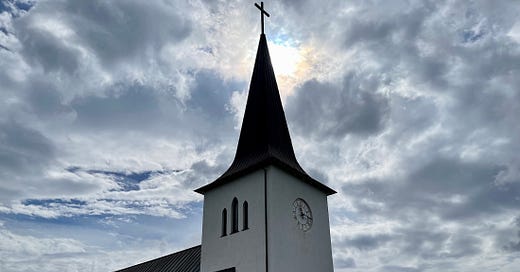On the Story of the Resurrection
Agnostic reflections from the holiest month of my life (Pt. 4)
It’s the finale! Thank you for sticking with me through my month-long dive into religion and Christian theology. This series has been valuable and educational for me, and I hope you’ve enjoyed reading it. (After this, I’ll take a break from writing about God and death. I promise.)
This has been a four-part series, featuring my reflections on the importance of prayer (Pt.1), the Passion of Christ (Pt.2), His death (Pt.3), and resurrection.
Easter Sunday
The final event in my Theology 101 lecture series was held at the Saint Ann Roman Catholic Church in Hoboken, NJ — the same church I'd attended on both Palm Sunday and Good Friday. What was the subject of this event? Well, it was the same as all Easter Sundays since the dawn of AD-time: resurrection.
Upon reflecting on that service, I had an important realization.
The Man, The Martyr, The God
Christ's Passion is among the most ubiquitous and enduring narratives of all time, yet His story subverts the structure of the hero's journey.
The Passion of Christ goes against nearly every aspect of Campbell's monomyth. And that's because Jesus was not a hero. On Earth, he was a martyr; in Heaven, God. He was never a hero.
In the archetypal story, the hero is called to adventure and leaves his ordinary world. Then, he faces great adversity in the unknown world, ultimately enduring and overcoming a great ordeal, seizing his reward. Finally, he returns to the ordinary world with earned wisdom, a changed man.
Does that fit the story arc of Christ's Passion, of His death and resurrection? Sure, Christ leaves His ordinary world and returns to it after a series of trials. That tracks. But Christ's ordinary wold is the Kingdom of Heaven, not Pride Rock, Kansas, or the Shire. In His ordinary world, Jesus exists in perfect unity with the Father. He doesn't endure trials like a hero, for the sake of self-improvement or self-discovery. He is not a man who goes on an adventure and comes home having gained great wisdom, like Bilbo returning to his hobbit hole. Jesus is a god who returns to Heaven after changing the world. (That is, according to the Christian faith.)
There's a big difference between Jesus and our archetypal hero. Jesus is already perfect. What growth could any adventure grant Him? Jesus's story is one of sacrifice, tragedy, and martyrdom — not one of triumph. He does not slay sin; He becomes sin and dies on the cross, on behalf of all mankind.
Christ's Passion is antithetical to the monomyth, a complete inversion of the hero's journey. And this may be one of the best pieces of evidence I've encountered for the validity of the Gospels. If Matthew, Mark, Luke, and John were spinning up an epic story, they would have made Jesus a hero. They would have made Him flawed and relatable and the climax triumphant, rather than tragic.
If the Gospels were meant to tell a compelling story, they would have at least followed a three-act structure.1 But no! There's Act I: The Last Supper, Judas's betrayal, and Christ's crucifixion. Then, there's Act III: His resurrection and His ascension to Heaven. The whole middle — all of that Saturday — is absent from the Gospels. Apparently, there's scant evidence in scripture for the idea that Christ went to hell when He died, before his resurrection. It's a hotly debated topic among Christian theologians and likely will be for at least a few more millennia.
By some accounts, Jesus dies and "descends into the underworld."2 While there, He strips the devil of his powers and and saves all the just souls that came before Him, bringing them with Him to the Kingdom of Heaven.3 This mysterious ordeal is referred to as the "Harrowing of Hell." So much of it is speculation, inferences based on the first and third acts of Christ's Passion.
Maybe Matthew, Mark, Luke, and John weren't trying to tell their version of The Odyssey. Maybe they were documenting history. Maybe they were documenting their account of an unfathomable mystery — what’s known in the Catholic Church today as “the mystery of faith.”
Or, maybe not.
Springboard:
What is a mystery in life that you can't help but investigate, whether it's on the scale of the universe or a memory written in your diary?
Here, I'm referring only to the parts of the Gospels discussed during Holy Week: the story of Christ's Passion.
This is one of the beliefs stated in the Apostles’ Creed, though it is absent from the Nicene Creed.
My account here is a mix of some of the beliefs of Christian Orthodoxy and Catholicism, referencing Wikipedia, so don't quote me.







I've always been fascinated by space and the mystery of how stars form and die. I recently went down a rabbit hole while doing research for my latest essay, "To Two Binary Stars." I binged Kurzgesagt videos (https://youtu.be/udFxKZRyQt4) and was captivated by Neil deGrasse Tyson's explanation of nuclear fusion (https://youtu.be/MJuVfVMJsc4). I remember scouring the Internet for early concept models of the James Webb Telescope in 2017, and I'm sure I'll continue to investigate these mysteries.
What a spectacular series, Garrett. I’m moved by your mediations. I feel a great sense of comfort in the realization that I never lost faith. It’s always been with me, and facing my uncertainty only makes me more certain of my faith.